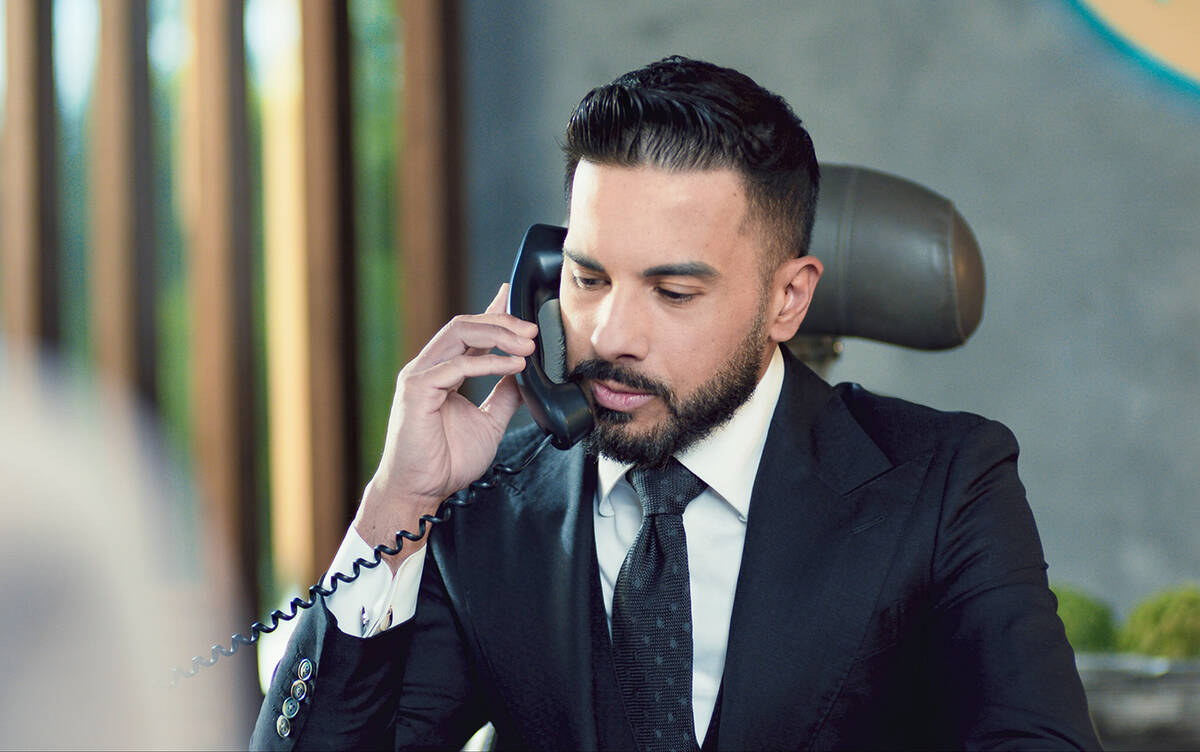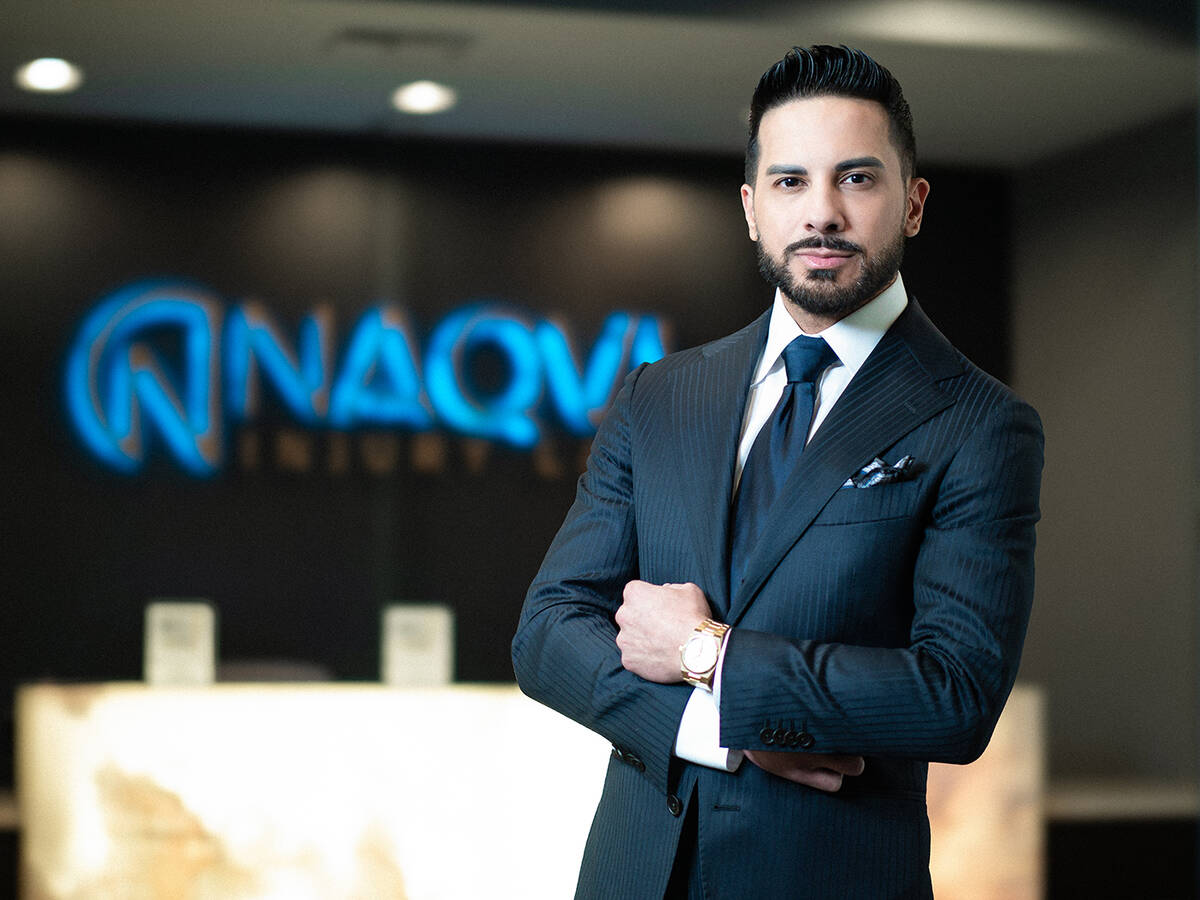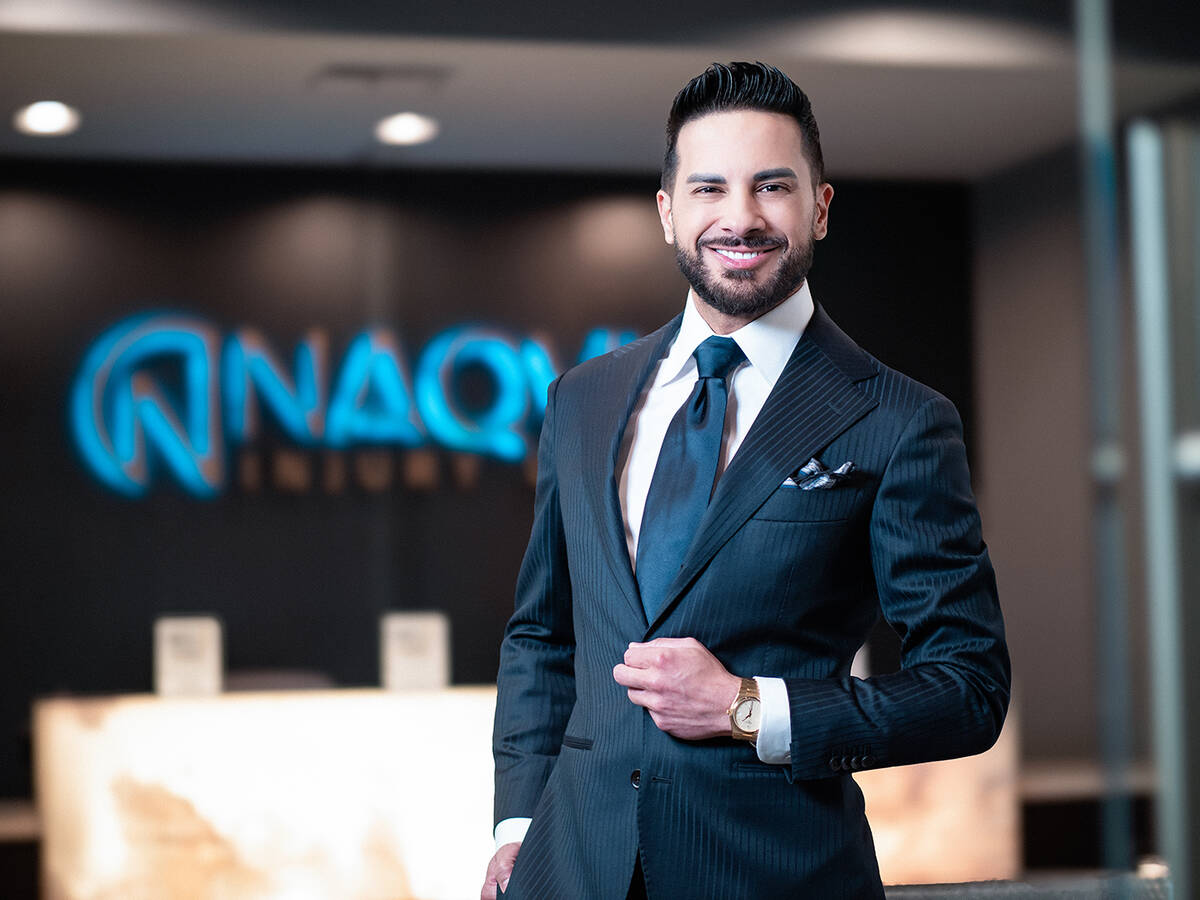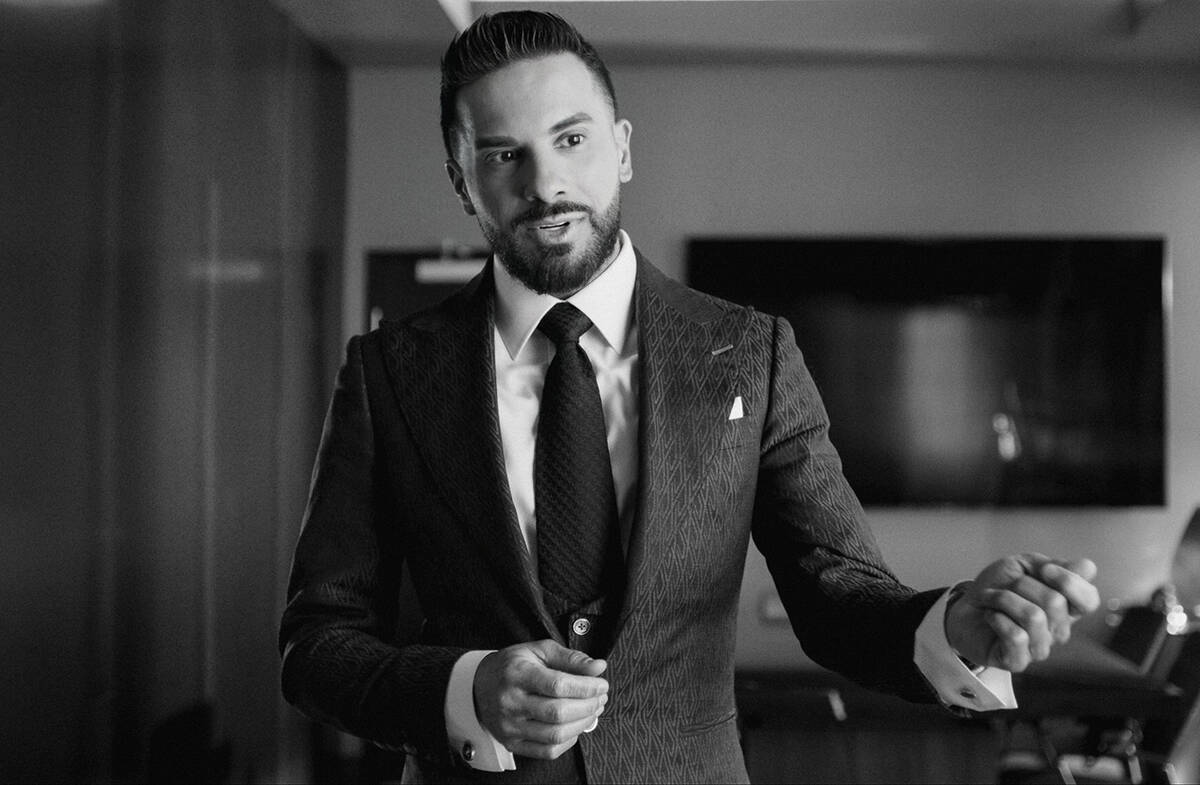What started as a husband-and-wife team opening their own law firm has turned into one of the more successful personal injury practices in Las Vegas for Farhan Naqvi and his wife, Ellie.
The 45-year-old Naqvi, who will celebrate the 16h anniversary of Naqvi Injury Law this year, also has been named one of the Top 50 Lawyers in America for 2024. Of the 1.3 million attorneys practicing in the U.S., less than 0.5 percent of attorneys and firms will receive this distinction. America’s Top Lawyers starts the selection for this list with nominations from peers, clients or its research team. The final selection involves a comprehensive research process that considers a range of factors including a lawyer’s overall achievements, years in practice, verdicts and other significant criteria.
Naqvi moved to the Phoenix area in the mid-1990s with his parents, Hameed and Massarat. After getting a scholarship to attend the University of Arizona law school, Naqvi headed to Las Vegas where he worked on construction defect cases and later worked for insurance companies before becoming a plaintiff’s attorney and starting his own firm. He and Ellie have two sons, Shawn and Daniel.
The Business Press sat down with Naqvi to talk about how he started his law firm and how he expanded his business.
Q: What made you want to become a lawyer?
A: My older sister, Saba, practices immigration law in Vancouver and ever since I can remember I wanted to be a lawyer. My dad wanted to be a lawyer, but in Pakistan his parents forced him into medicine or (being) an engineer. He’s a civil and structural engineer. It might be in our genes or something. I like helping people. I like the competitive spirit of making arguments in the courtroom. (That) appealed to me.
Q: What brought you to Las Vegas?
A: We had visited here and liked the climate. The thing I liked about Las Vegas is it seemed like a place where a lot of people at the time weren’t locals from here. Your friends are your extended family, and you got to choose your family. It seemed like a place with that whole casino-winning mentality. People didn’t care about what your name is and what you look (like). It was more about what kind of person you are and whether you can win for them. It was that sense of community that interested me in Las Vegas.
Q: Why did you go from working with insurance companies to representing plaintiffs?
A: There was something about representing the underdogs versus big corporations that appealed to me. I saw some of the injustices on the other side and, at the end of the day, when a company does something wrong, you can’t put them in jail. The only way you can effect change is in the pocketbook. Planes are safer because of prior air disasters that happened that forced them to be safer. Cars are safer. It took lawsuits to understand they can’t put profit over safety of people. I was very compelled by the idea of an everyday person having access to the legal system and not having to pay a lawyer by the hour. Having access to (our own) courtroom and being on a level-playing field with the big corporations is one of the things that excites me. (That is why) we built our own mock courtroom in our office. It’s been an honor and a privilege and been a lot of fun putting pieces together of these cases and getting justice for our clients.
Q: What does a personal injury lawyer entail?
A: (It would mean)anytime a client has been injured (because of) someone else’s fault, whether it be a car crash, someone drinking and driving, a defective product, a premises liability case, like some sort of a trip hazard.
Q: When did you launch your practice?
A: From 2004 to 2008 I worked on the plaintiff’s side, and in 2008 I branched off and started my own firm. I called it Personal Injury of Nevada. I thought that would be an easier name to pronounce than Naqvi. Then I realized with search engine optimization, that when you typed in Personal Injury of Nevada, you would get every one of my competitors. My wife said you need to call it Naqvi. I was worried it would be hard to remember and hard to pronounce. She said that’s who we are and your sense of identity. We changed the name to Naqvi Injury Law, and it did give me a sense of identity and purpose and meaning. The name has turned out to be something I’m proud of because we have an amazing group of people here who treat the firm like it’s their own.
Q: Why did you start the firm?
A: I started the firm because I wanted to march to my own drum. There were times I thought I should go work for another attorney. My wife said I’m never going to be happy unless you open up your own law firm.
Q: What was it like in the beginning?
A: It started as just me, and Ellie was my first employee. We were in an executive suite and anytime a client would come I would say to her: “Go take a walk around the building so the client doesn’t think this is our only office.” One-by-one we would get more cases and hire more people and it’s grown over the years. One of the things we never forgot was to treat every person the same at the firm. There’s a lot of firms where there’s a hierarchy and the file clerks go to lunch with the file clerks, secretaries with secretaries and paralegals with paralegals and lawyers with lawyers. Here, it’s not about that at all. I think the small-firm atmosphere we started with has permeated today. You see us at weddings of our employees and trips to Mexico with our employees. We really hire people (who) we love to work with (and who) are genuinely good people and care about other people and work extremely hard. I’m grateful to have surrounded myself with people that are extremely smart, and we have fun doing the team-building and culture activities.
Q: How many employees do you have?
A: I would venture to estimate approximately 90 employees. We have three offices. Our main office is at Flamingo Road and the 215 (Beltway). We have an office in the northwest at the 215 and Durango Drive; and we have an office in Henderson at 215 and Stephanie Street.
Q: How did you grow the business?
A: I say treating your employees like your first client (is important.) If your employees are happy and understand you always have their back; and you’re going to work with them and not call them out, then they (will) truly love working for (you). Confidence breeds confidence. Our employees treat the firm like it’s their own. Also, don’t think about the money. When I cared about nice things and money, the universe never gave it to me. When I focused on every single interaction and locked in then my only motive is to be as authentic and genuine as I can. That means we will do whatever it takes to make sure a client is happy. We turn down far more cases than we take because we can’t be everything to everyone. I don’t focus on the money aspect of things. I have other people in the firm that do that. I focus solely on doing my job; and my job is to make sure each and every interaction that I have with a client, opposing counsel, the courts and judges have nothing in mind but getting the fairest and best result for a client.
Q: With all these competitors out there, how do you stand out?
A: I think it’s customer service, culture and community. We have strong ties in the community and love giving back. People see that. Lawyers don’t have the greatest reputation; and so we try to do the opposite of what that reputation and perception is. It’s about communication with a client. A lot of times people say they have trouble getting in touch with their lawyer, and I give everybody my cellphone number. People say attorneys are greedy. That’s a perception people have. We go out of the way to take that completely off the table and try to go above and beyond and think about their best interests. I think people see that. Do we get every case? No. Are there some cases that are probably not the best suited for the firm? We’re not going to take a case where we’re not doing the best possible service to that case and our clients. Sometimes, that’s making the hard decision that this is not the right case for us. I think the reason so many of our cases have come from other lawyers to handle is because of our integrity and reputation and because we give back. We have seamless processes. We’re not afraid to try a case 10 times in our courtroom before getting to the real trial. Basketball players don’t stop practicing when they get to the NBA. It surprises me that lawyers don’t practice their cases to mock jurors. All we do is practice, practice, practice and learn from our mistakes and get better. It is a competitive field, but we haven’t been hurting for business. Hopefully, people see us for what we are and keep growing in a way that respects our core values, which is never to compromise customer service or results for our clients. By far, the majority of our cases come from word-of-mouth referrals.
Q: What’s your outlook for the legal profession in Las Vegas?
A: As we grow, there’s more opportunities for everybody in any profession that works hard and does right by its citizens to do well. I think as the community becomes more savvy and has tools to do their research; I think the people who do things the right way are going to succeed and people that don’t will get noticed as not 100 percent of what they portray themselves to be.











